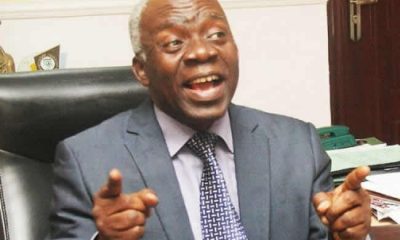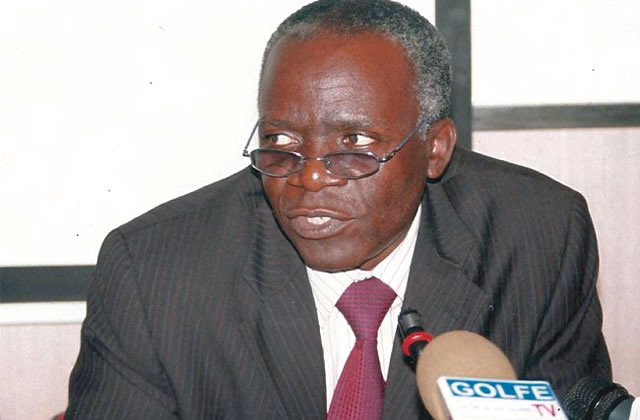Opinion
Why Cape Verde’s Contempt For Ecowas Court Must Not Stand By Femi Falana

BACKGROUND FACTS
On 12 June 2020, Mr. Alex Saab, a Special Envoy of the Bolivarian Republic of Venezuela (hereinafter referred to as “the Claimant”) was arrested by Cape Verde while undertaking a humanitarian Special Mission to purchase basic foodstuffs and medicines from Iran. Cape Verde claimed that because it was not notified in advance that the Claimant was a passenger on the aircraft that made a technical re-fueling stop and as a result was not obliged to respect the relevant United Nations Special Missions Convention of 1969. Venezuela has highlighted that given the state of Venezuela-US relations and the fact that the Claimant was travelling from Venezuela to Iran, the Special Mission was necessarily secret and, in any case, Venezuela invoked his immunity a few hours after his arrest in the early hours of 13 June, 2020.
As the Claimant’s arrest and detention could not be justified, he approached the ECOWAS Court for the enforcement of his human rights to dignity, liberty, fair hearing and freedom of movement guaranteed by articles 5, 6, 7 and 12 of the African Charter on Human and Peoples Rights respectively. While the case was pending in the Court the Bolivarian Republic also appointed the Claimant as its Alternate Permanent Representative to the African Union on 24 December 2020. In the unanimous judgment delivered on 15 March 2021 the ECOWAS Court declared that the Claimant’s arrest was illegal because at the time of his arrest neither an INTERPOL Red Notice nor an arrest warrant had been issued against him and that he be freed immediately. Having found that the Red Notice was not issued (at the request of the United States) until the day after the Claimant was arrested, on 13 June 2021 the ECOWAS Court went on to say that as a result of the illegal arrest, then the entire extradition process initiated at the request of the United States was also illegal and must be terminated immediately and ordered Cape Verde to pay US$200,000 in compensation.
CAPE VERDE BOUND BY SUPPLEMENTARY PROTOCOL
The Republic of Cape Verde has refused to comply with the decision of the ECOWAS Court on the ground it did not sign the Supplementary Protocol of the Court. Such contemptuous conduct has been endorsed by the Supreme Court of Cape Verde which has purportedly ratified the request of the United States for the extradition of Ambassador Saab. This is a violation of Article 5(3) of the Revised Treaty which provides that, “Each Member State undertakes to honour its obligations under this Treaty and to abide by the decisions and regulations of the Community” as well as Article 15(4) which states that, “Judgments of the Court of Justice shall be binding on the Member States, the Institutions of the Community and on individuals and corporate bodies.” The language of the Supplementary Protocol of the ECOWAS Court, however, is precise and clear. Article 11(2) thereof states that the “This Supplementary Protocol shall definitively enter into force upon the ratification by at least nine (9) signatory States…” In this case 14 out of 15 ECOWAS Member States signed the Protocol. Thus, the Supplementary Protocol came into force since January 19, 2005.
In justifying its decision, the Supreme Court said that Article 210 of the Constitution of Cape Verde “cannot fail to be interpreted as meaning that the recognition by the State of Cape Verde of the administration of justice made by these courts presupposes the consent of the State of Cape Verde, not only to the creation or existence of the Court, but also to the respective rules of jurisdiction and procedure.” We submit that the Supreme Court of Cape Verde fell into a grave error of law in replying on article 210 of the Constitution because the provision recognizes justice administered by courts like the ECOWAS Court instituted through international treaties to which Cape Verde is a party. In a desperate move to undermine the decision of the ECOWAS Court the Supreme Court said that as “the State of Cape Verde has not even signed the Protocol of 2005, there is no basis for it to be considered linked to such an instrument and, therefore, to the decisions of the Court of Justice handed down under the powers conferred on it by such an instrument of which it is not a party.”
With respect, the Supreme Court deliberately refused to apply the doctrine of estoppel to the facts of this case which would have proved, beyond any shadow of doubt, that Cape Verde has demonstrated its commitment to be bound by the provisions of the Supplementary Protocol of the ECOWAS Court. We submit that in public international law, the doctrine of estoppel protects legitimate expectations of States induced by the conduct of another State. The term stems from common and Anglo-American law, without being identical with the different forms found in domestic law. It is supported by the protection of good faith (bona fide) in the traditions of civil law. Despite varying perceptions and definitions in doctrine and practice, the features and essential components of estoppel in public international law are generally accepted today. As it is most commonly described, “estoppel is a rule of international law that bars a party from going back on its previous representations when those representations have induced reliance or some detriment on the part of others”. According to Professor Ian Brownlie in his book “Principles of Public International Law, [Seventh Edition, Oxford University Press, 2008]”, estoppel is a general principle of international law, resting on principles of good faith and consistency. The essentials of estoppel are:
1. A statement of fact which is clear and unambiguous,
2. This statement must be voluntary, unconditional, and authorised; and
3. There must be reliance in good faith upon the statement either to the detriment of the party so relying on the statement or to the advantage of the party making the statement.
In glossing over the ratification of the Supplementary Protocol by the conduct of Cape Verde the Supreme Court said that its conclusion “is not undermined by the fact that the State of Cape Verde has appointed Judges who had or have a seat in that Court, or even by the fact that the President of its Supreme Court is inherently a member of the Community Council of Justice, in so far as that the country is part of the Court, whose initial protocol was signed by the Head of his Government, and it is still certain that there is no evidence that he has refused to accept the commitments, but only those, which result from that signature.” But beyond the nomination of candidates as judges of the ECOWAS Court the Republic of Cape Verde took part in the discussions of the relevant organs of the ECOWAS which led to the expansion of the mandate of the ECOWAS Court to hear and determine human rights cases.
Specifically, Cape Verde participated in the meeting of the Council of Minister which recommended the Supplementary Protocol for approval of the Authority of Heads of State and Government of the ECOWAS. Furthermore, the 28th Summit of the ECOWAS Heads of State and Government held at Accra on 19th January 2005 which approved the Supplementary Protocol was attended by the leaders of all the member states of the ECOWAS including Mr. José Maria Pereira Neves, the then Prime Minister of the Republic of Cape Verde. At the Summit the leaders unanimously resolved inter alia as follows:
“It was noted that the Protocol on the ECOWAS Court of Justice did not provide the Community Superior Court with adequate powers to contribute sufficiently to the acceleration of the regional integration process. The Authority consequently amended the said protocol.
The amended protocol enables the Court to adjudicate in disputes arising from the interpretation and application of supplementary acts annexed to the Treaty, decisions, regulations and directives of the relevant Community institutions. The amendment permits individuals and corporate bodies to seek redress in the Court. The amendment also establishes a procedure for the execution of decisions of the Court and for ensuring compliance therewith.” See the Final Communique of the 28th Summit of the ECOWAS Heads of State and Governments held at Accra on 19th January 2005.)
It is on record that The Gambia was the only member state of the ECOWAS that had proposed certain amendments to the Supplementary Protocol in September 2009. In the amendment The Gambia sought for the provision of an appellate division of the ECOWAS Court and exhaustion of domestic remedies before the institution of cases by victims of human rights abuse. The amendments were rejected by all the member states of the ECOWAS including Cape Verde. Thereafter, Cape Verde has actively participated in the discussions leading to the restructure of the Court. In fact, at no time in the eleven years since the Protocol was signed has Cape Verde ever raised any concern about the binding nature of the Supplementary Protocol. It therefore appears that this is the first, and to date, the only occasion when Cape Verde has felt the need to challenge the binding nature of the Protocol in order to perpetrate the illegal arrest of Alex Saab.
As noted earlier, former Minister of Justice of Cape Verde, the Honourable Justice Januária Tavares Silva Moreira Costa (“Justice Costa”) was one of the 3 members of the panel of the Court which deliberated and ruled on the matter between Mr. Alex Saab and Cape Verde. In fact, the Judge had the honour of reading the final judgment on 15 March 2021. Before Justice Costa, Justice Benfeito Mosso Ramos (“Justice Ramos”) was a panelist and Vice-president of the Court 2009 to 2014. Justice Ramos currently serves as Advisory Judge of the Cape Verdean Supreme Court of Justice. Justice Ramos is a member of the Judicial Council of the ECOWAS Court – a department which is responsible for the recruitment and discipline of the judges of the Court – and before him Justice Fatima Coronel had fulfilled the same role
WAIVER OF SOVEREIGN IMMUNITY
Alex Saab’s defence team has put forward the view that apart from participating in the proceedings of the Court in the case of the Claimant, Cape Verde has continued to derive maximum benefit from the existence of the ECOWAS Court. To that extent, the defence argues, Cape Verde is bound to comply with the judgment and orders of the ECOWAS Court of 15 March, 2020 contrary to the misleading impression expressed by the Cape Verdean executive and judicial authorities. The Defence goes on to make the following observations demonstrating Cape Verde’s submission to the jurisdiction of the ECOWAS Court:
1. Cape Verde recognised the jurisdiction of the ECOWAS Court by fully participating in the process by the presence and conduct of its legal representative, Dr. Henrique Borges. Cape Verde voluntarily exercised its right to participate in the process, filed submissions and was heard by the Court.
2. It is important to reiterate that the objections of Cape Verde to the jurisdiction of the ECOWAS Court were heard and rejected by the Court. This approach is an element of the customary international law called “forum prorogatum” and is enshrined, for instance, in Article 36 of the Statute of the International Court of Justice.
3. While ruling on the application for provisional measures on December 2, 2020, the ECOWAS Court had ordered that the Claimant be removed from prison custody and placed in a house arrest because of his status. After initial defiance of the order Cape Verde the Attorney-General of Cape Verde secured an order of the Constitutional Court to placed the Claimant in a house custody!
Having submitted to the jurisdiction of the ECOWAS Court and participated in the proceedings of the ECOWAS Court in the case the Republic of Cape Verde cannot turn round to claim sovereign immunity. In African Reinsurance Corporation v Abate Fantaye (1986) LPELR-SC.1/1986, the Supreme Court of Nigeria held that “Now the basic rule at common law as regards the jurisdiction of English Courts over sovereigns or sovereign states was that a foreign sovereign or sovereign foreign state was immune from the jurisdiction of the courts; although the courts would take jurisdiction if the sovereign submitted to their jurisdiction. It follows, therefore, that sovereign or diplomatic immunity can be waived.” In the instant case, Cape Verde submitted to the jurisdiction of the ECOWAS Court. Thus, by submitting to the jurisdiction of the ECOWAS Court Cape Verde decided, suo motu, to waive its sovereign immunity. We submit that Cape Verde cannot turn round to challenge the competence of the Court or question the valid and substituting judgment of the Court. Notwithstanding that Cape Verde has not signed the Supplementary Protocol we submit that it is bound by the judgment of the ECOWAS Court in the case of Alex Saab v Republic of Cape Verde.
NO BILATERAL TREATY BETWEEN CAPE VERDE AND UNITED STATES
In confirming the judicial authorization for the Appellant’s extradition to the United States the Judges of the Supreme Court failed to advert their minds to the fact that there exists no bilateral treaty between the Cape Verde and the United States to justify the request for the extradition. The detention of the Applicant based on an extradition request by the United States is illegal in every material particular. It is trite in international law that every extradition request has to be anchored on the applicable legislation itself and a specialized text. See Nicholls Montgomery and Knowles, The Law of Extradition and Mutual Assistance (3rd edn, Oxford: Oxford University Press, 2013). No doubt, both Cape Verde and the United States of America are parties to the United Nations Convention Against Transnational Organized Crimes. But after the ratification of the Convention, the Senate of the United States resolved that “For the United States, the Convention will not provide an independent legal basis for extradition, which will continue to be based on U.S. domestic law and applicable bilateral treaties.” See https://www.govinfo.gov/co ntent/ pkg/CRPT-109erpt4 /html/ CRPT-109erpt.htm.
It is submitted that the United States is legally bound by publicly stating [through official statements] that “the Convention will not provide an independent legal basis for extradition”, as this reflects its intention to apply in all cases its domestic law and applicable bilateral treaties. See for this proposition, the Nuclear Tests case (Australia v. France), ICJ Reports (1974), 253, at 267-71. Since there is no extradition treaty between the United States and Cape Verde, the request for the extradition of the Applicant to the United States is precluded by reason of its expressed intention, from relying on the Convention as a substitute for a bilateral extradition treaty. In other words, it is no longer open to the US, to rely on the Convention, having expressly indicated an intention not to use the Convention as a substitute for a bilateral extradition treaty. See Arbitral Award by the King of Spain, ICJ Reports (1960), 192 at 213.
In Attorney General of the Federation v. Kinglsey Edegbe (Suit No FHC/ABJ/CS/ 907/2012) an application was made for the extradition of the respondent before the Federal High Court, Abuja upon a request by the Authorities of the Netherlands in relation to offence of traffic in human persons. The Applicant contended that even though there is no existing bilateral extradition treaty between Nigeria and the Netherlands, the offences for which the surrender of the respondent is sought, is provided for by the United Nations Convention Against Transnational Organised Crimes and its Protocol which Nigeria has ratified and that such forms the legal basis for the extradition request. In refusing the grant of the extradition request the court held that an extradition agreement must be domesticated pursuant to section 12 (1) of 1999 Constitution and section 1(1) Extradition Act before the extradition provisions of the treaty can be invoked in Nigeria.
As the US will not grant any extradition request without subjecting it to its domestic legislation it cannot be permitted to request the Government of Cape Verde to extradite the Applicant on the basis of the provisions of UN Convention contrary to its expressed intention. By picking and choosing which legal framework to apply, the US is acting contrary to its expressed intention and clearly in bad faith. To allow the US to get away with this will seriously undermine the integrity of international law and the rule of law, and amount to a travesty. In view of the decision of the United States to subject the United Nations Convention Against Organized Crimes to her domestic law it is undoubtedly clear that the extradition of the Applicant cannot be based on the same Convention. In other words, since there is no extradition treaty between the United States and Cape Verde the United Nations Convention Against -Transnational Organized Crimes cannot form the basis of the legal extradition of the Claimant.
RETROACTIVE DIPLOMATIC IMMUNITY
Curiously, the Supreme Court refused to accord legal recognition to the appointment of the Claimant as the Alternate Ambassador of Venezuela to the African Union with effect from December 24, 2020. The Court knew or ought to know that the doctrine of retroactive diplomatic immunity applies to the alleged criminal cases involving the diplomat. It has been held in several cases that diplomatic immunity acquired during the pendency of proceedings destroys jurisdiction even if the suit was validly commenced before immunity applied. In Abdulaziz v. Metropolitan Dade County, 741 F.2d 1328 (11th Cir. 1984) the issue involved was whether a certificate of diplomatic status granted after the commencement of a suit supports dismissal of the suit based on diplomatic immunity, and whether a grant of diplomatic status is reviewable by this Court. The Court held that once the United States Department of State has regularly certified a visitor to this country as having diplomatic status, the courts are bound to accept that determination, and that the diplomatic immunity flowing from that status serves as a defense to suits already commenced. See United States v Knobrsgadr, 15 F. SUPP. 3d 388 (S.D.N.Y. 2014).
Knowing fully well that it could not question the diplomatic status of the Claimant notwithstanding that the alleged criminal offences involving him were committed before his appointment last December the Supreme Court decided to behave like Pontius Pilate. Hence, in arriving at a predetermined conclusion the Court refused to pronounce on the status of the envoy when it held that “what has been said does not mean a practical and definitive impossibility for the Claimant to have this intended status of special envoy recognised by the rightful person, in the later stages of the extradition process, with decisive consequences on the outcome of the same.” Thus, by asking the “rightful person” to determine the fate of the Claimant the Supreme Court abdicated its judicial responsibility. Since the appointment of the Claimant as a diplomat has quashed the request of the United States for his extradition the Republic of Cape Verde ought to comply with the order of the ECOWAS Court by releasing him from custody without any further delay.
The ECOWAS has repeatedly expressed commitment to human rights and the rule of law. That commitment is seriously under threat, as Cape Verde continues to act in contempt of ECOWAS and its court—the Community Court of Justice in Abuja. The Authority of the ECOWAS must stand up to the abusive tactics of Cape Verde. The ECOWAS and its member states cannot stand aside while Cape Verde is failing to uphold its voluntary commitments to human rights and rule of law.
-

 News4 days ago
News4 days agoOsun RAAMP Opens Bid For Road Constructions Statewide
-

 News3 days ago
News3 days agoCapacity Building: OHIS Organizes Retreat For New Board Members
-

 News2 days ago
News2 days agoFamily Of Gruesomely Murdered Pastor Cries For Justice
-

 News1 day ago
News1 day agoJust In: Nigerian Governor Dethrones 15 Traditional Rulers, Reinstates 7







